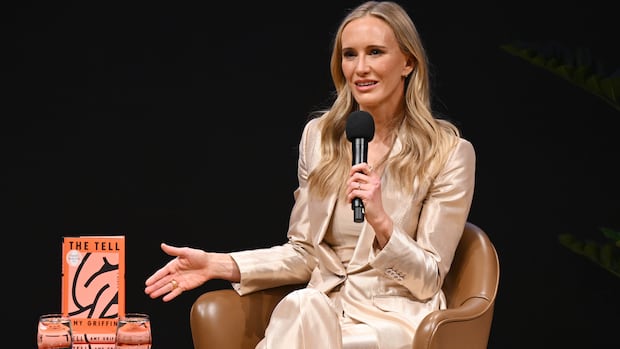WARNING: This story contains allegations of sexual violence and may affect those who have experienced it or know someone affected by it.
When Amy Griffin’s memoir The Tell came out earlier this year, it received attention from celebrities such as Oprah Winfrey, Reese Witherspoon and Gwyneth Paltrow. The Tell details the billionaire’s story of how MDMA-assisted therapy unearthed her long-hidden memories of child sexual abuse.
But a recent New York Times investigation has raised questions about the legitimacy of Griffin’s abuse claims in The Tell. The article also brings up her lack of disclosure about her and her husband’s financial investment into a pharmaceutical company focused on MDMA-assisted therapy.
Griffin declined to speak with The New York Times and other media outlets. When The New York Times sent her defamation lawyer a long list of questions to fact-check their story, her lawyer responded: “The mere sending of this document has caused additional trauma and extreme physical and emotional harm to a survivor of sexual assault, which is inexcusable.”
Today on Commotion, host Elamin Abdelmahmoud speaks about the ethics of publishing a memoir with author and editor Jen Sookfong Lee as well as Nathan Maharaj, director of content marketing at Rakuten Kobo.
We’ve included some highlights below, edited for length and clarity. For the full discussion, listen and follow Commotion with Elamin Abdelmahmoud on your favourite podcast player.
WATCH | Today’s episode on YouTube:
Elamin: [The New York Times reporters] went to her hometown and they couldn’t find anyone to corroborate her story. But they found another woman whose story is very similar to the one that Amy claims is hers. Jen, when you read that investigation in The Times, what jumped out at you from that investigation?
Jen: I’ve written memoir, I’ve edited memoir. Memoir is always sort of muddy, right? I think everyone expects that. Nobody accurately remembers the argument over gravy at Thanksgiving 15 years ago.
But I think, in this case, when the author is writing about what is actually a very serious crime — and it’s an allegation that carries life-changing consequences for everybody involved — I think accuracy does matter. And especially if that author is one of the wealthiest and most connected women in the world, especially if she received a $1 million advance for that book, as she did. This isn’t a book that anyone was expecting to just sell, like, 12 copies. Everybody knew it was going to sell from the very beginning. And in that case, I think that accuracy really does matter in this particular memoir.
Elamin: Nathan, what kind of steps should the publisher of a memoir like this take to make sure that the story is as true as it can confirm in the first place?
Nathan: Whitney Frick is the executive in charge of The Dial Press, which is the imprint within Penguin Random House that published this. This is not her first rodeo. She is, in fact, a designer and choreographer of many-a-rodeo. Penguin Random House has the institutional knowledge, aside from Ms. Frick…. They published James Frey, the quintessential example of the memoir that turned out to not be exactly in line with the facts.
Elamin: You’re talking about A Million Little Pieces. That’s the [memoir] that Oprah endorsed and then later was like, “Oh, maybe not all the things in A Million Little Pieces ended up being true.”
Nathan: Yeah. And it was embarrassing for Oprah. So it’s hard to say what a publisher should do, but Ms. Frick’s comment to The Times was: “Book publishers are not investigators.” And that’s true. But to Jen’s point, you’re going to say stuff, stuff’s going to go out into the world, it’s going to have an impact. I am so, so curious about the contract between Amy Griffin and The Dial Press because there’s no way that nobody at Penguin Random House sat down Whitney Frick and said: “And if it’s false, what’s our plan?” And that, absolutely, I expect would be in the contract somewhere.
Elamin: Yeah, I think the thing that maybe people don’t necessarily understand about publishing is that legal’s got to read it. At a certain point, the legal department of a giant publisher like this would go, “OK, we can handle the outcome of whatever legal repercussions will come from this book.”
As [the book] is coming out, all these gigantic people are lining up, getting ready to promote it. We’re talking about Reese Witherspoon, we’re talking about Gwyneth Paltrow, we’re talking about Jenna Bush Hager, we’re talking about Oprah! Those are all people who exist in Amy Griffin’s general social world. This is a publisher’s dream to have all those people say, “This is the book that I would like everybody to buy.” Nathan, do you think that got in the way of the critical thinking necessary and the due diligence that was necessary to see this book responsibly out in the world?
Nathan: To say it got in the way is to posit that the critical thinking was still in the room to be obstructed. Listen, the book pitch went out with a list of celebrities that Amy Griffin has a personal relationship with, who have access to a large audience and who would be amenable to promoting it. And it was this epic list of everybody you need.
There are no sure things in publishing, but when an author shows up and says, “I’ve got this juicy story, and these are the people who’ll promote it.” Sure, here’s a million dollars, we can make that back a few times over.
I’m sure people thought about this critically, but also the profit-and-loss statement on this book was very tempting, especially not even written. This book was pitched with: “I’m a face, these are other faces, let’s go make some money.”
You can listen to the full discussion from today’s show on CBC Listen or on our podcast, Commotion with Elamin Abdelmahmoud, available wherever you get your podcasts.

